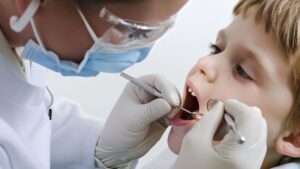At Krishees Dental, we know that understanding dental health issues is the first step towards a beautiful smile. One condition that can impact both aesthetics and functionality is an underbite. In this comprehensive guide, we will delve into what an underbite is, its causes, symptoms, diagnosis, treatment options, and how to maintain your oral health.
What is an Underbite?
An underbite occurs when the lower jaw extends further forward than the upper jaw. This misalignment creates a situation where the lower teeth sit in front of the upper teeth when the mouth is closed. It can lead to difficulties in chewing, biting, and speaking, while also affecting the overall appearance of your smile.
Causes of Underbites
Understanding the causes of underbites can help you identify potential risk factors. Here are the primary causes:
1. Genetics: Many people inherit jaw and teeth structure from their parents. If your family has a history of underbites, you may be more likely to develop one yourself.
2. Jaw Growth: Imbalances in the growth of the upper and lower jaws can lead to misalignment. This issue may become more apparent during childhood as the jaw continues to develop.
3. Thumb Sucking: Children who suck their thumbs beyond a certain age can alter the position of their teeth and jaws, potentially leading to an underbite.
4. Tooth Loss: Losing teeth can cause adjacent teeth to shift, which may result in an underbite. This shifting can disrupt the balance of the bite.
5. Dental Trauma: Injuries to the jaw or teeth can also result in misalignment, sometimes causing an underbite.


Symptoms of an Underbite
Recognizing the symptoms of an underbite can prompt timely intervention. Here are the most common signs:
a) Jaw Discomfort: Many individuals experience pain or discomfort in the jaw, particularly when chewing or speaking.
b) Difficulty Chewing: An underbite can make it challenging to bite into food properly, leading to issues with eating.
c) Speech Difficulties: Some people may find that their speech is affected, resulting in slurring or other communication challenges.
d) Uneven Wear on Teeth: Misalignment can cause certain teeth to wear down more quickly than others, potentially leading to further dental issues.
e) Facial Appearance: An underbite can affect the symmetry of the face, leading to a chin that appears more prominent.
Diagnosing an Underbite
If you suspect that you have an underbite, schedule a consultation with us at Krishees Dental. During your visit, our experienced team will conduct a thorough examination. We may use X-rays and other imaging techniques to assess your bite and determine the severity of the misalignment.
Treatment Options for Underbites
Treating an underbite depends on its severity and the patient’s age. Here are some common treatment options:
1. Braces: Traditional braces remain one of the most effective solutions for correcting underbites. They work by gradually shifting teeth into the correct position over time. Treatment typically lasts 1-3 years, depending on individual circumstances.
2. Clear Aligners: For those who prefer a less noticeable option, clear aligners like Invisalign can correct mild to moderate underbites. These custom-fit aligners are removable, making them convenient for eating and cleaning.
3. Orthognathic Surgery: In severe cases, jaw surgery may be necessary to realign the upper and lower jaws. This option is generally considered for adults whose jaw development is complete.
4. Retainers: After completing treatment with braces or surgery, retainers help maintain the new tooth position and prevent relapses.


Maintaining Oral Health with an Underbite
If you have an underbite, maintaining good oral hygiene is essential to prevent further dental issues. Here are some practical tips:
a) Brush and Floss Daily: Brush your teeth twice a day with fluoride toothpaste, and don’t forget to floss regularly. This helps remove plaque and prevents gum disease.
b) Visit Your Dentist Regularly: Regular check-ups at Krishees Dental allow us to monitor your oral health and catch any issues early.
c) Avoid Hard Foods: While you are undergoing treatment, be mindful of your diet. Avoid hard or sticky foods that could strain your teeth and jaw.
d) Wear a Mouthguard: If you grind your teeth or play contact sports, consider wearing a mouthguard to protect your teeth.
Conclusion
An underbite can affect your dental health and self-esteem. At Krishees Dental, we are committed to helping you understand this condition and offering personalized treatment options. If you suspect you have an underbite, don’t hesitate to reach out to our team for a consultation. Together, we can work towards restoring your smile and ensuring your oral health.
FAQs
1. Can an underbite be corrected in adults?
Yes, adults can correct underbites using braces, clear aligners, or surgery, depending on the severity of the case.
2. Are underbites hereditary?
Absolutely! Genetics play a significant role in jaw and teeth alignment, so if your family has a history of underbites, you may be at higher risk.
3. Will an underbite affect my speech?
It can affect speech, but treatment often leads to improvements in both speech clarity and bite functionality.
4. How long does treatment for an underbite take?
Treatment time varies by method and individual case but typically ranges from several months to a few years.
5. Is it painful to correct an underbite?
You may experience some discomfort during treatment, but our team will ensure you are comfortable and informed throughout the process.

Leave a Reply